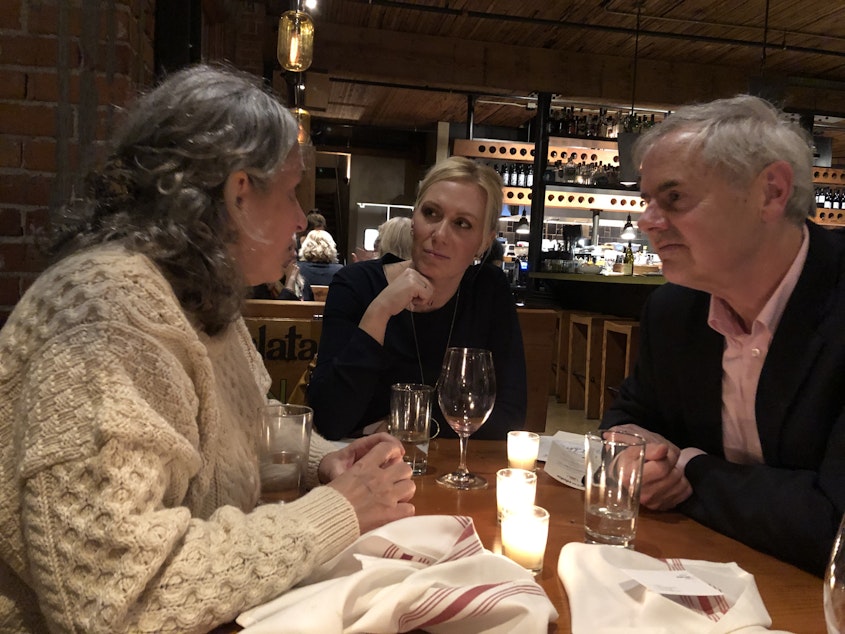Let's talk about death so we can live a better life

Death is one of those taboo subjects in polite conversation.
But three Seattle area restaurants recently hosted dinners to encourage discussions about death with strangers.
How do you plan a menu for a serious topic like death? At Terra Plata on Capitol Hill, the food was simple, but hearty and nourishing. Chef owner Tamara Murphy said that's intentional.
“It’s not about the food,” Murphy said. “They’re not coming for the food, but of course, that’s a big part of it, because over food you have interesting conversations.”
Terra Plata was one of the hosts of the death dinners. Walking in, it felt like a regular dinner party. First, guests lit up candles to remember loved ones who’ve passed on. As the appetizers were served, guests turned their attention to the conversation prompts on the table.
“This is the first question: What would you choose as your last meal?” said Ali Taylor. Her neighbor Cheryl Jennings had a hard time choosing, but finally picked a family dish. “I think I always go for my mom’s lasagna. I just always liked it.”
Jennings is a retired diplomat. She’s also part of the People’s Memorial Association, a nonprofit focused on end-of-life planning.
Sponsored
For this event, PMA partnered with another nonprofit, Death Over Dinner. Their goal is to help change how people view death by focusing on the things in life that really matter.
Wes Van Voorhis is a physician. His wife, Debra Jarvis is a hospital chaplain. Both have seen death first hand.
“Having death in my clinical practice and her hospice practice, we have a richness to life," Van Voorhis said. “Every day is so full of brightness, knowing it could be our last."
Jarvis added, “We make it a practice — it’ll be 34 years in December — to always say good-bye, to kiss you good-bye, I love you. Because this could be it. I’ve been with families who said, 'why didn’t I say good bye, why was I mad, why didn’t I blah, blah?' So it’s given us both a sense of urgency.”
It makes sense. So why is it hard to talk about death? Van Voorhis recalled a friend with a terminal illness who didn’t want to talk about the fact he was dying.
Sponsored
“He looked at death as a failure — 'I stop being, I stop creating, and I stop existing.' I think a lot of modern society has a real problem with death. We don’t see it anymore," he said. "It’s a thing to be feared, it’s the end of us.”
There was a lot of nodding at the table. Jennings said it doesn’t help that we live in a youth-oriented culture.
“We don’t want to talk about getting old; we put our old people away,” she said. “We kind of look at them like they did their bit, that’s great, congratulations, we’ve all moved on and you haven’t, so just go away grandpa.”
Here’s the paradox, Jennings said: Being exposed to death allows us to live better.
Ali Taylor agreed. She brought up her mom who worked as a hospice nurse for 25 years.
Sponsored
“She always had the most positive outlook, she would come home and have the cutest stories of the people or their animals. It shocked me that I knew what she was going to do every single day, yet she never had a bad day," Taylor said.
The main course, a lamb shoulder roast, arrived and was served family-style. As the plates passed, the table pondered the last question: “What would you want people to say about you at your funeral?”
The common theme in their answers were living life without limits and investing one’s time in people.
Which takes us back to why it’s important to have conversations about death. Debra Jarvis noted, it makes us reflect on life.
“There’s still time for us. I can say, 'I want this and this and this,' and I look at my life and I’m going, can people say that right now? Maybe, maybe not. I better get a move on,” she said.
Sponsored
Jarvis likened life to a buffet: It’s not going to be open forever; it’ll close at a certain time. You might as well get your fill before dinner ends.




